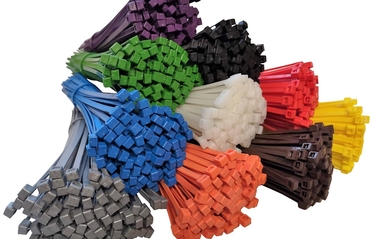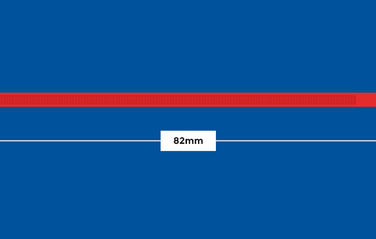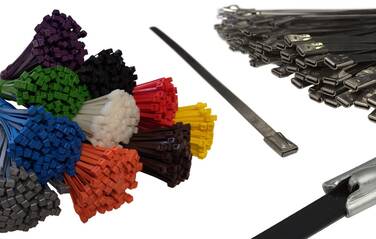This comprehensive guide to electrical tape explains everything you need to know from what it is and what it is used for, to whether there are any alternatives you can use instead.
What is electrical tape?
Electrical tape, often found in the toolkits of electricians, plumbers, and DIY enthusiasts is a simple yet essential item. Designed mainly for insulating electrical wires and other materials that conduct electricity, electrical tape is a specialised tape that is crucial for keeping electrical systems safe and functioning properly.
Also known as insulating tape, electrical tape is a pressure-sensitive tape used to insulate electrical wires and other conductive materials. Its purpose is to prevent electrical current from accidentally passing to other wires or conductive surfaces, which helps to reduce the risk of short circuits, fires, and electric shocks.
What is electrical tape made from?
Although sometimes made from rubber or mastic, most modern electrical tapes are made from PVC (polyvinyl chloride). This provides not only insulation but also resistance to moisture, abrasion, and UV light.
What do the different colours of electrical tape mean?
Here in the UK, different colours are used for electrical tape to identify different types of wiring as set out in the wiring regulations (BS 7671).
Black – Neutral conductor (for flexible cables) and general insulation/low voltage.
Brown – Live conductor (typically indicates a live wire in newer wiring systems).
Blue – Neutral conductor (in fixed installations or low-voltage applications), low voltage, phace C.
Green or Green/Yellow stripes – Earth (always used for protective conductors).
Yellow - Low voltage, phase B
Red – May indicate a live wire in certain applications, low voltage, phase A.
Grey, White, and others – May be used for additional identification purposes.
Having a nationally recognised colour code ensures safety and universal recognition of all wires in an installation. Using the correct colour coding is crucial for safety as it ensures that anyone working on the system in the future can easily identify the role of each wire.
What is electrical tape used for?
Electrical tape is typically used in a range of domestic and professional applications:
Insulation for wires and cables - the main use for electrical tape is insulation for any wires and cables that conduct electricity. When wires are damaged or worn, they pose a significant safety risk, but wrapping electrical tape round any exposed wires provides a protective barrier which can reduce the risk of electrical faults. It is recommended that electrical tape should only be used as a temporary measure or as additional insulation to a proper connection. It should NEVER be used instead of proper wire connectors or permanent repairs.
Temporary repairs – as mentioned above, electrical tape is not a long term solution but it can be used for temporary repairs on cables and wires until a permanent fix can be carried out. For example, wrapping a frayed extension lead in electrical tape can reduce immediate risk, but replacing the lead completely is the safest thing to do.
Bundling and organising - electrical tape can also be used like cable ties – to bundle wires and cables together neatly. This keeps wires organised and reduces potential trip hazards which occur when cables get tangled. 5 ways to manage cables safely in an office has some great ways to keep the workplace safe!
Protection against moisture and corrosion – self amalgamating tape is a specialised type of electrical tape that provides moisture resistance and weatherproofing. Useful in outdoor or damp environments where exposed wires might become corroded or short out, self amalgamating tape forms a waterproof seal over time and is often used in automotive repairs or outdoor lighting installations. Learn more about how to use self amalgamating tape.
What can I use instead of electrical tape?
There are things that can be used as a safe alternative to electrical tape, such as self amalgamating tape, heat shrink tubing, and wire connectors. Then there are things that should never be used such as duct tape, which will not insulate and is flammable, and masking tape which is made from paper and therefore weak.
Is electrical tape waterproof?
Electrical tape is water resistant, rather than waterproof, as the adhesive can break down when wet which can affect the effectiveness of the watertight seal. Read Is electrical tape waterproof? to find out more.
PVC electrical tape from cableties-online
Our electrical tape is made from polyvinyl chloride (PVC tape) and meets all British safety standards for insulation resistance and durability (BS EN 60454). Fully functioning down to -18°C, our PVC tape is available in industry-related colours. PVC tape mixed colour packs are also available.
Electrical tape is a small item that has a big role to play in electrical safety. Whether you’re rewiring a plug, doing routine maintenance, or tackling a DIY project, having a reliable roll of electrical tape on hand is always a good idea. Just remember to use it correctly, follow UK wiring colour codes, and know when a job calls for a professional. Proper electrical safety should always come first.
If you need any further help or advice, our experienced team is available by email at sale@toolingplastic.com Alternatively give the team a call on 01623 412160, Monday-Friday from 8.30am until 5.00pm.








